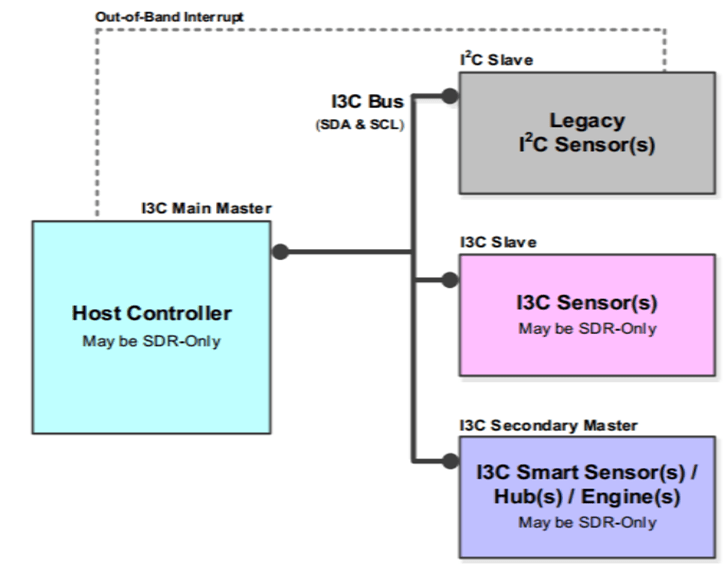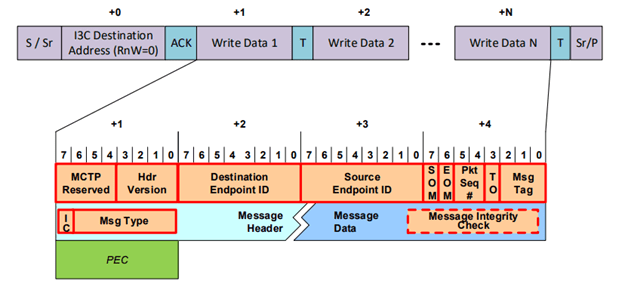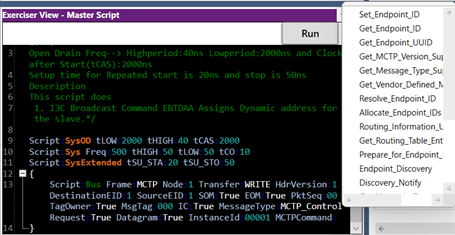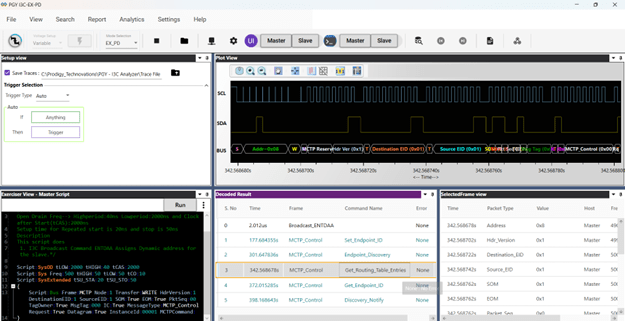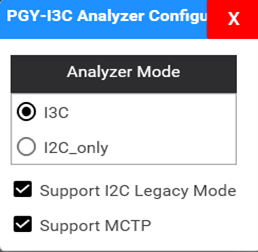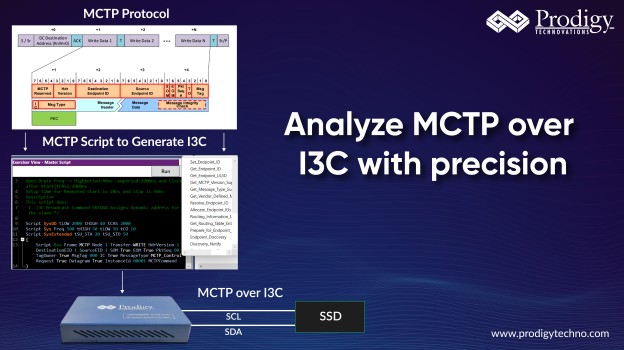
MCTP Over I3C in the PGY-I3C-EX-PD
Overview of I3C
MIPI I3C, or I3C, stands for the MIPI I3C (Sensor Interface) standard, which serves as a versatile and efficient interface for connecting sensors to application processors, microcontrollers, and other intelligent devices. I3C is designed to overcome limitations of traditional sensor interfaces like I2C and SPI by offering improved data throughput, lower power consumption, and additional features such as dynamic addressing and in-band interrupts. It combines the best aspects of both I2C and SPI while introducing innovations tailored to the demands of modern embedded systems. I3C facilitates streamlined communication between sensors and host devices, providing a scalable and standardized solution that enhances interoperability and flexibility in a wide range of applications, from smartphones and IoT devices to automotive and industrial systems.
Overview about MCTP:
The MCTP, or Management Component Transport Protocol, is a communication protocol that facilitates communication between management controllers, components, and intelligent platforms. It is commonly used in system management and platform management applications, providing a standardized approach for managing devices in a distributed computing environment.
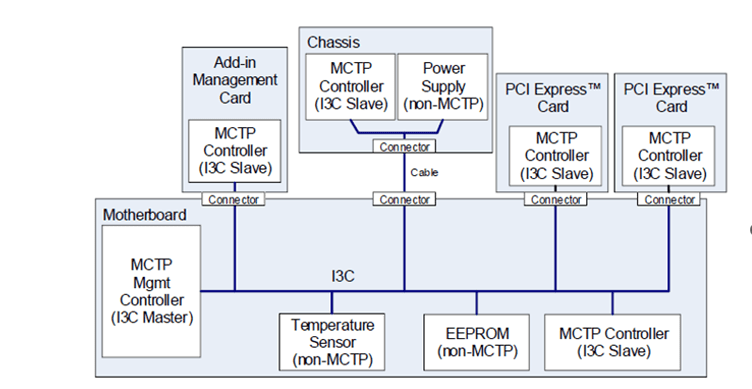
Figure 2: Physical Topology of I3C bus in the MCTP
It serves as a standardized and interoperable solution for communication between management controllers, components, and intelligent platforms. MCTP enables efficient and secure interactions, facilitating tasks such as configuration, monitoring, and control of hardware components in a system. With a focus on scalability and flexibility, MCTP is widely used in diverse applications, including data centers, cloud computing, and embedded systems. It provides a framework for managing the lifecycle of components, ensuring seamless integration and communication across various hardware elements within a computing environment.
MCTP in I3C:
The integration of MCTP with I3C leverages the advantages of both protocols. I3C serves as the physical layer for MCTP, offering a reliable and efficient communication medium for management and control purposes. MCTP messages are encapsulated within I3C frames, enabling seamless communication between management entities while benefiting from the unique features of I3C.
MCTP (Management Component Transport Protocol) in I3C (MIPI I3C) signifies the integration of MCTP as a management and control protocol within the framework of the I3C standard. In this context, I3C serves as the physical layer for MCTP, providing a reliable and efficient communication medium for managing devices in distributed computing environments. The combination of MCTP and I3C allows for seamless communication between management controllers, components, and intelligent platforms. MCTP messages are encapsulated within I3C frames, leveraging the unique capabilities of I3C such as dynamic addressing and in-band interrupts. This integration enhances the overall efficiency and manageability of devices, enabling standardized communication for configuration, monitoring, and control purposes in systems adopting both MCTP and I3C protocols. The use of I3C as the underlying transport layer for MCTP contributes to a more streamlined and interoperable approach to managing components within a computing system.
Challenges in Decoding MCTP:
Implementing MCTP decoding capabilities within an I3C interface presents several challenges that need to be addressed for successful communication and interoperability:
- Complex Message Structure: MCTP messages can have a complex structure with multiple layers of encapsulation. Decoding these messages requires a deep understanding of the MCTP protocol and the ability to parse nested structures accurately.
- Error Handling: Ensuring robust error handling is crucial, especially in dynamic and distributed environments. Properly managing error conditions, such as corrupted messages or protocol violations, is essential for maintaining the reliability of the communication link.
- Compliance with Specifications: MCTP specifications may evolve, and ensuring compliance with the latest standards is vital for compatibility with other devices and systems. Regular updates to the decoding capabilities may be required to support new features and enhancements introduced in the MCTP standard.
- Performance Optimization: Efficient decoding is essential for real-time applications. Balancing the need for comprehensive decoding with optimized performance is a key consideration, particularly in resource-constrained environments.
- Interoperability Testing: Ensuring interoperability with a diverse range of devices implementing MCTP over I3C is critical. Rigorous testing against different MCTP implementations helps identify and resolve compatibility issues, ensuring seamless communication in various deployment scenarios.
By addressing these challenges, developers can implement robust MCTP decoding capabilities within an I3C interface, enabling reliable communication and effective management of devices in intelligent platforms.
How does the PGY-I3C-Exerciser and Protocol Analyzer help in decoding the MCTP protocol packets?
Exerciser Mode:
Within the settings menu of the Analyzer, users can opt for ‘Support for MCTP,’ a feature akin to triggering the emulating and decoding capture process of MCTP traffic. Following this selection, users can configure both the controller and target and later emulate the MCTP traffic by sending MCTP commands from the software.
When utilized in exerciser mode, the PGY-I3C-EX-PD grants users the flexibility to configure it either as a controller or target. Subsequently, it can emulate MCTP traffic and decode the results.
Initialization of MCTP Protocol:
(Here Controller is referred to as Primary and Target is referred as Secondary)
Case-1Transmission of MCTP packets from the Primary to the Secondary
This happens using Primary-initiated private write transfer as defined in Specification for I3C Basics. The transfer shall be directed to the Target I3C address used for MCTP protocol communication.
The PGY-I3C-EX-PD facilitates this scenario through the configuration of both the controller and target, initiating the Private Write Transfer from the controller using MCTP commands.
The decoded results are conveniently displayed in the Protocol listing and timing window of the accompanying software.
Case-2MCTP Packet Reading Based on Target IBI (Target to Controller)
The Transmission of MCTP packets from target to the Controller according to the IBI mode shall happen using the following general sequence as per the MCTP spec:
Target has an MCTP packet ready for transmission to the controller, it shall initiate an I3C IBI with MDB = 0xAE (as assigned in MIPI Mandatory Data Byte (MDB) Values Table registry) to inform the controller about the data ready. The controller shall read the MCTP packet (or multiple packets) from the Target using I3C Private Read transfer.
This scenario can be achieved by the PGY-I3C-EX-PD which enables users to configure both the controller and target devices. Upon receipt of the IBI from the target with the MDB 0xAE, the controller initiates reading of the target’s register (MCTP packet) using the Private Read command in response to the IBI signal as shown below.
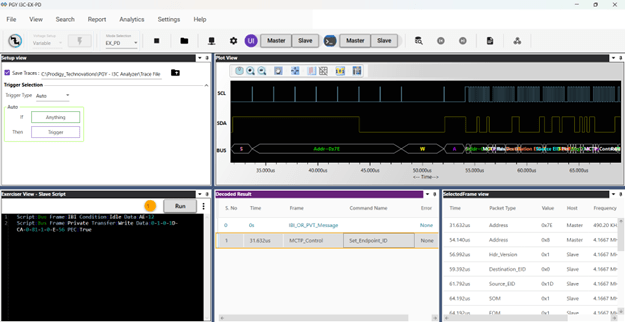
In Analyzer Mode:
Testing interoperability across a diverse array of devices implementing MCTP over I3C is a crucial step in ensuring reliable communication and compatibility in multifaceted deployment scenarios. The PGY-I3C-EX-PD (Protocol Analyzer for I3C with MCTP Decode) plays a pivotal role in this rigorous testing process. By employing the PGY-I3C-EX-PD, testing engineers gain a powerful tool to systematically evaluate different MCTP implementations, identifying and resolving potential compatibility issues.
The user can monitor the MCTP packet by choosing the ‘MCTP mode’ and the PGY analyzer gives the ability to analyze commands as per the MCTP specification thereby enabling designers to decode the issue effectively.
One of the key features of the PGY-I3C-EX-PD is its analyzer, which continuously sniffs the MCTP communication on the I3C bus. This thorough monitoring process captures the intricacies of the communication protocol, allowing the detection of any deviations from the standard along with the command names. The decoded results are then conveniently displayed in the Protocol listing and timing window of the accompanying software. This visual representation provides a comprehensive overview of the MCTP communication, helping engineers in understanding the data flow, analyzing protocol sequences, and pinpointing any deviation that may arise.
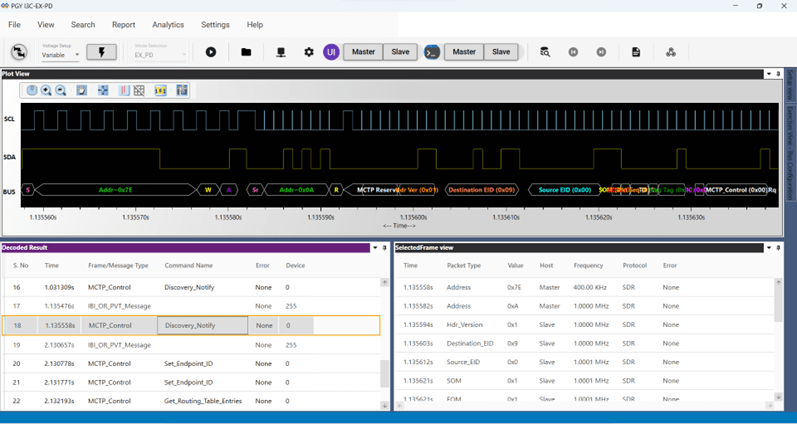
By leveraging the capabilities of the PGY-I3C-EX-PD in interoperability testing, developers and engineers can ensure that devices implementing MCTP over I3C can communicate seamlessly, thereby enhancing the reliability and performance of the overall system. The real-time monitoring and decoding capabilities of the PGY-I3C-EX-PD contribute to a streamlined testing process, allowing for efficient identification and resolution of any compatibility challenges that may arise during the integration of MCTP and I3C in diverse device ecosystems.


